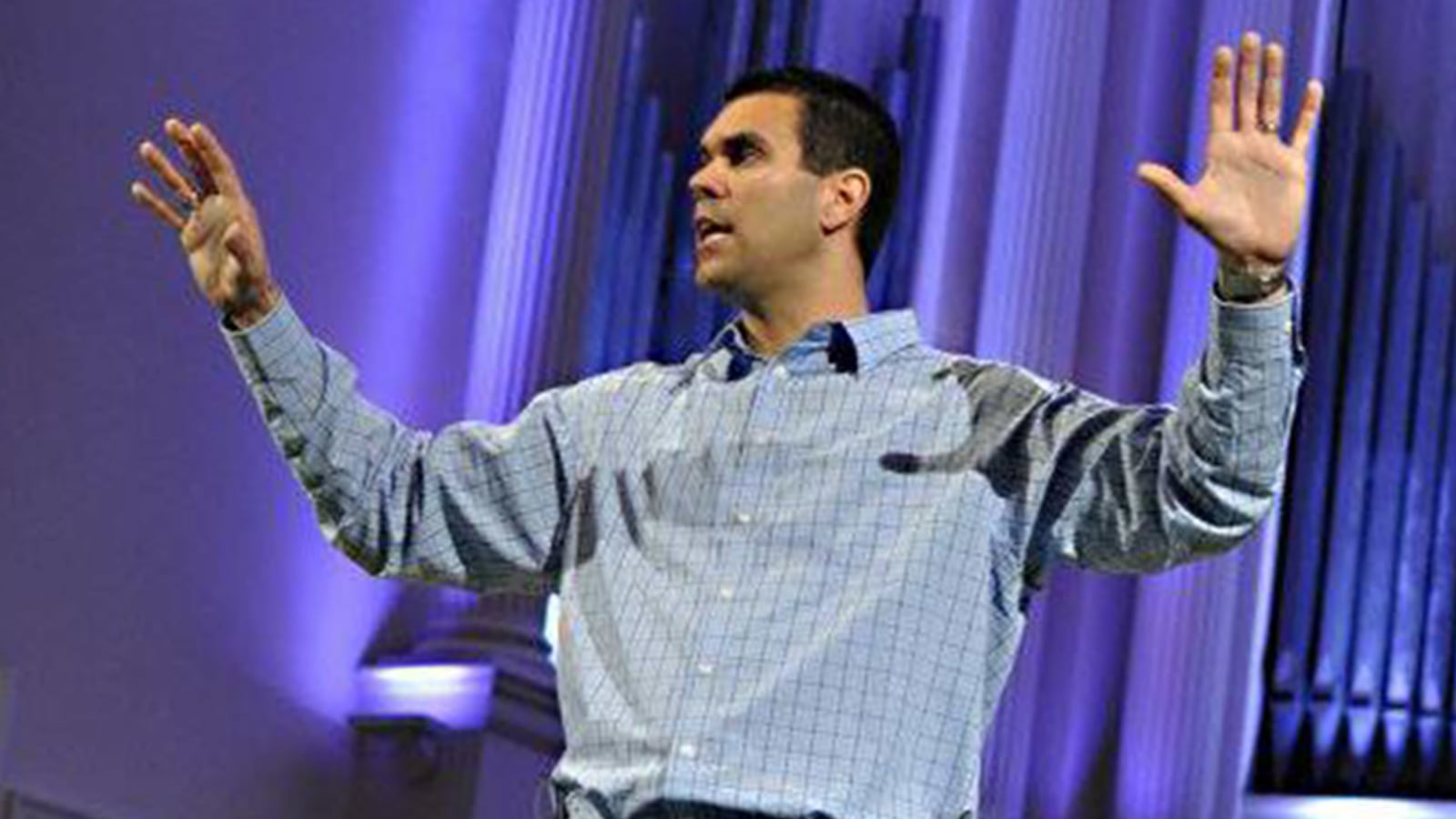Another conservative Christian pastor has said that homosexuality is a sin, and that according to the Bible, gays should be put to death. Yawn. What’s interesting here?
Actually, quite a bit—and some evidence of the ground shifting within the evangelical community.
First, this wasn’t a backwoods, country bumpkin; no Fred Phelps or Bryan Fischer; nor a dottering old Pat Robertson. This was the young, telegenic, and popular Robby Gallaty of Brainerd Baptist (mega-)Church in Tennessee. Despite significant fanfare that evangelicals are evolving on homosexuality and same-sex marriage—about 23 percent of evangelicals now support (PDF) civil marriage equality—there is still a rear-guard, and that includes young pastors like Gallaty.
Second, Gallaty, in choosing to orate for 20 minutes on the subject of homosexuality, has bucked the emerging trend to make the issue a “very low priority,” in the words of Rick Warren. For whatever reason, it’s still a high priority for Gallaty. (Naturally, the gay press has enjoyed speculating as to the exact reason.)
Yet what is perhaps most striking about Gallaty’s hateful sermon is how old it sounds—as if he hasn’t read a book on the subject of Christianity and sexuality in two decades. He makes the same thoroughly refuted arguments about Scripture’s supposed clarity on homosexuality, as if the shelf-full of books by John McNeill, Virginia Mollenkott, Daniel Helminiak, Gene Robinson, Mel White, Matthew Vines, Steve Greenberg, Jeffrey Chu, and, yes, this writer, all of which have completely dispatched these claims.
Examples? Gallaty equates Leviticus’s prohibition on male anal sex with a ban on “homosexuality.” He uses the word “abomination” to describe the Levitical sin, apparently unaware that the Hebrew term toevah actually means a cultic ritual violation, not an ethical one (and thus has no relevance for Christians). He quotes Paul out of context, conveniently omitting the fact that Paul was talking about why non-Christian courts are unfit to hear disputes, not laying down laws about sex.
And so on. None of this is new anymore. What’s interesting is that Gallaty acts as if none of it has even been said. His theological head is deep in the sand.
Likewise his pseudo-scientific one. Unbelievably, Gallaty says that sexuality—unlike race and gender—can be changed. Did he miss the news that Exodus International, the world’s leading ex-gay “change therapy” organization, has closed its doors? Or the scandals involving homophobic-but-secretly-gay Christian leaders like Ted Haggard, George Rekers, John Paulk, and a legion of others? Does he still think you can pray the gay away?
For that matter, has Gallaty—who recommends the “high road” of celibacy to gay Christians—not been following the revelations from the Catholic Church, where “celibate” men have turned out to be sexual predators in the worst possible ways? Does he really think that telling gay Christians to be celibate is a good idea? Still?
Just a few years ago, these kinds of claims could be dismissed as mere ignorance. Today, however, they seem more like willful ignorance.
And that, I think, is the shift. Anti-gay evangelicals like Gallaty are increasingly sounding like anti-evolutionists and climate deniers. Really, he doth protest too much. The overwhelming evidence is in. Sexual orientation is a trait, its expression leads to good things (family for some, pleasure for others; human fulfillment for all), and the Bible can easily be read narrowly rather than broadly. The mainstream national debate is over.
But if you only watch the right channels and read the right books, you wouldn’t know that. Like someone still believing Pluto to be a planet, or Lance Armstrong to be an honest athlete, you’d be trapped in a kind of intellectual time-warp, and say manifestly stupid things as a result. You just wouldn’t get it.
That is an important change. Even Biblical literalists (and according to their creed, Brainerd Baptist Church is definitely that) have generally understood the terms of the debate. There are gay people, including gay Christians. Some of them are queerly weird, others virtually indistinguishable from anyone else. None are mounting an “attack on the family and the marriage.”
Maybe, then, the future of evangelical homophobia will be similar to that of other counter-factual, anti-scientific Christian beliefs. Most people will move beyond them. But a hard core will cling to the old view, keeping clear of inconvenient truths—first and foremost the existence of pro-gay Christians, or Christian climate activists. (In fact, the evangelical “creation care” movement may save the day on climate change, breaking with the GOP’s know-nothing dogma. Stay tuned.)
Indeed, all this has happened before—not just on major civil-rights issues, but on any prophecies that turned out to be wrong. As Leon Festinger’s classic 1956 study When Prophecy Fails first described (and as two generations of scholars have qualified, detailed, and generally agreed with), most believers give up on false prophecies, but a devoted core becomes even more devout. It consumes (and produces) its own media, explains the false prophecy in a way that blames believers for being insufficiently devout, and manages its “cognitive dissonance”—a term coined by Festinger—in ways which at first seem contorted and weird, but eventually become accepted wisdom.
This process has happened, in various ways, to Mormons, Jehovah’s Witnesses, Aum Shinrikyo, UFO cults, Sabbatean Jews, and unreconstructed racists like the Christian Identity movement. Arguably, it happened to the earliest Christians as well. Some of these groups become benign, others grow quite dangerous, and many eventually disappear.
But Gallaty’s sermon in Tennessee suggests a similar pattern may now be underway among evangelical Christians. Many are, indeed, changing their attitudes. But beware the zeal of the unconverted.




